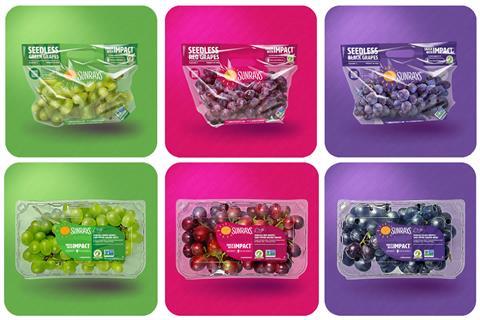All of the brand’s grape suppliers are in the process of achieving Sustainably Grown certification

New York-based fruit importer and distributor Jac Vandenberg has announced that its Peruvian grape grower-partners, Uvica and Agrolatina, have become the first grape producers in Peru to achieve Sustainably Grown certification.
The accreditation scheme is administered by SCS Global Services, a pioneer and leader in sustainability standards and third-party certification for nearly four decades.
“We are incredibly excited for our Peruvian grower-partners on this momentous accomplishment,” said John Paap, brand manager at Jac Vandenberg.
“This is no easy achievement and it’s really a testament to the growers we partner with for our Sunrays brand. These aren’t just growers producing top-quality eating grapes; these are growers exercising the highest standards of sustainable farming practices that all in our industry can aspire to.”
Uvica’s Frank Michell commented: “It is a source of pride for us to be one of the first companies in Peru to have achieved this certification.
“It also means a great opportunity, since it allows us to strengthen our management systems in order to have continuous improvement in all our processes, with a focused view on the impact that we may have on our ecosystem.”
Agrolatina said the certification presented another tool for achieving the highest level of sustainability.
“Currently, we live in a changing world. Due to the effects of man’s activity on earth, this has resulted in climate change and its effects,” said Katherine Paredes.
“As a measure to combat climate change, Corporación Agrolatina seeks to be able to mitigate the impact that its activities may generate in the ecosystem, and has earned various certifications, among which is Sustainably Grown.
“For Corporación Agrolatina, Sustainably Grown and the other socio-environmental certifications represent a great tool when evaluating hazards and mitigating risks, all with the ultimate goal of achieving sustainability and demonstrating our commitment to the world.”
While not all Sunrays grapes will carry the Sustainably Grown seal this season, Sunrays said all of the group’s grape growers are actively in the process of achieving the certification.
The Sustainably Grown standard is among the world’s foremost sustainable agriculture standards. It provides agricultural producers with a detailed roadmap to satisfy the growing market for sustainable products.
Simultaneously, it provides customers with assurance that products meet environmental standards second to none, that farm workers and farm communities are protected and engaged, and that the farm is economically resilient.
“We see a lot of claims these days from different brands and companies about doing things sustainably, but rarely are they backed up or independently verified. With Sunrays we show the receipts. When we say we’re doing things sustainably, we’re serious and we now have the certification to back it up,” said Paap.
“Transparency is everything, and it is important to us and our grower partners that the consumer understand that our claims are substantiated. With Sunrays you are getting the best quality, most sustainably sourced grapes in the world.”
Kevin Warner, director of ESG certifications and strategy at SCS Global Service’s food and agriculture division, commented: “It is encouraging to see companies like Jac Vandenberg integrate innovative, sustainable practices throughout their production and packaging operations.
“Given the wide distribution of Sunrays brand grapes, more consumers than ever will be able to smile when they pick up this popular product, not just because the grapes taste good, but because of the careful efforts that went into producing them. We look forward to evaluating more Sunrays vineyards.”
In addition to its commitment to sustainability, Vandenberg continues to innovate in areas of transparency. From this season, Sunrays grape packaging will include a QR code providing information behind that specific package of grapes.
Consumers will be able to learn how and where their grapes were produced, pictures of the farm where the grapes came from, the carbon footprint of that package, how to properly dispose of the packaging and recipe ideas.
“This is a real industry first for grapes,” said Paap. “We are giving the consumer full visibility of the bag or clamshell they pick up, so they can connect with it in ways they never could before.
“We want folks to engage more deeply with their purchase. Food is such an emotional experience – giving consumers a direct view into the story behind their purchase is really exciting.
“We are getting the consumer closer to the grower, establishing yet another layer of experience and relationship with their food.”



